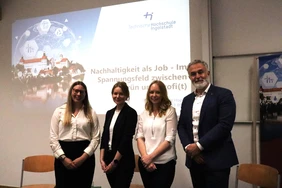Prof. Dr Holger Hoppe, Head of the Bachelor's degree programme in Sustainability and Environmental Management (NUM) at THI, kicked things off. He emphasised the skills that are in demand today: Systems thinking, forward-looking action, collaboration and critical thinking - skills that are indispensable in the face of complex global challenges. According to the OECD, more than one in five jobs in Germany is now "green" - with further growth potential.
Lea Schaller, NUM graduate, reported on her personal path into the sustainability sector. A change of degree programme from business studies to NUM marked the start of a meaningful career for her. She was particularly enthusiastic about the topic of sustainability reporting during her studies - an area that is currently gaining momentum due to new EU regulations.
Laura Sommer, Sustainability Manager at Sonax, also confirmed that the topic of sustainability has arrived in many medium-sized companies. In her company, she is driving forward strategic sustainability projects - from energy efficiency and more environmentally friendly packaging to social initiatives. Her key finding: sustainability pays off - by saving resources, increasing employer attractiveness and as a component of modern corporate management.
Jana Kern from the “Institut für Arbeitsmarkt- und Berufsforschung (IAB)” at the Federal Employment Agency shed light on the labour market policy dimension. Of around 4,000 professions analysed, 1,600 already had relevant "green skills". Even if the Neuburg region is currently still below the national average, the transformation offers a wide range of development opportunities - including for established professions.
Over the course of the evening, it became clear that sustainability professions require far more than idealism - strategic thinking, adaptability and assertiveness are required. "Companies are not democracies," said Hoppe. It requires both clear guidelines from the top and a broad awareness among the workforce. The salary? According to studies, many green professions are not only meaningful, but also financially competitive.
The discussions were encouraging - for future skilled workers as well as for companies. The THI site in Neuburg a.d. Donau with its application-oriented study programmes, research projects and corporate collaborations offers fertile ground for sustainable business models. It is already clear today that sustainability is no longer a niche topic - it is increasingly becoming an integral part of the working world of tomorrow.


![[Translate to English:] Logo Akkreditierungsrat: Systemakkreditiert](/fileadmin/_processed_/2/8/csm_AR-Siegel_Systemakkreditierung_bc4ea3377d.webp)








![[Translate to English:] Logo IHK Ausbildungsbetrieb 2023](/fileadmin/_processed_/6/0/csm_IHK_Ausbildungsbetrieb_digital_2023_6850f47537.webp)


